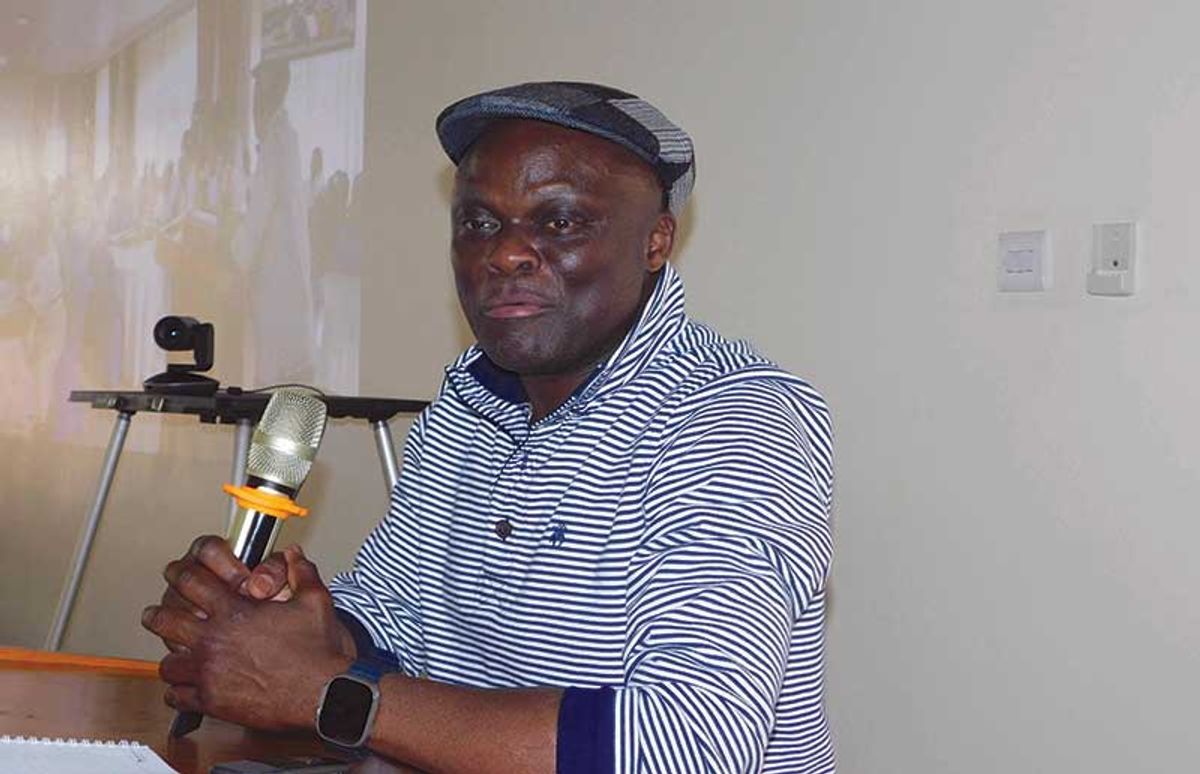
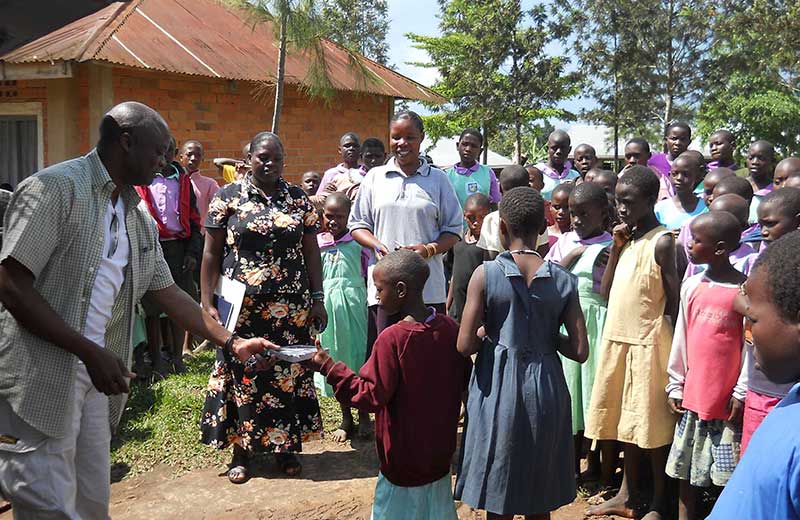
Professor-Fred-Ssewamala-hands-over-a-pack-of-biscuits-to-a-child-at-one-of-the-schools-in-the-Happy-Families-study Photo by Michael J. Ssali
Masaka Dioceses, in partnership with International Center for Child Health and Development (ICHAD) and Strengthening Mental Health and Research Training in Africa (SMART), is conducting a series of trainings and consultative meetings aimed at promoting mental health under a multifamily group curriculum named Happy Families (Amaka Amasanyufu). It is a five-year-study sponsored by ICHAD and SMART to find out the contribution of peaceful and happy families on mental health.
It is emphasized in the Happy Families Training Manual, also designed by ICHAD and SMART, that behavioral health is the connection between our behavior and the health and wellbeing of the body, mind, and spirit.
‘’Mental health includes emotional, psychological, and social wellbeing. It affects how we think, feel, and handle stress, relate or communicate to others and make choices. Mental health is important at every stage of life, from childhood and adolescence through adulthood,” ICHAD and SMART teach that most mental health issues begin in the home and can be avoided if families are happy.
According to Phiona Namatovu, Data Collection Officer at ICHAD, some twenty schools in Masaka Sub-region were selected to participate in the Amaka Amasanyufu study and one hundred and twenty facilitators were trained by ICHAD and SMART. Once a week, a team from ICHAD goes to a school to observe the training and consultative meetings of selected school children and their parents or caretakers as well as the facilitators.

Professor-Fred-Ssewamala
Relying on data from more than 2400 Ugandan caregivers, ICHAD found significant numbers of children with oppositional defiant disorder or conduct disorder – which became worse due to loss of parents, large families and financial constraints, resulting in drug and alcohol abuse, stigma, and stress. One in seven children in Sub-Saharan Africa is struggling with a serious mental disorder according to Jeannette Cooperman in “Offering Hope –and A Way Forward”. SMART mentors and prepares young people in psychiatric research and therapy and trains community health workers to recognize and train mental disorders. Both ICHAD and SMART are directed by Professor Fred Ssewamala at Washington University in St Louis.
Dr. Fred Ssewamala has been conducting research projects in Masaka Region since 2004 about the impact of HIV on orphaned youths — the challenges they face which include school fees difficulties, poverty, stigma, shame, desperation, discrimination, poor ARV adherence, drug abuse, and mental health issues among others.
Dr. Ssewamala himself lost his parents as a little child during the civil unrest in Luwero Triangle that resulted in the establishment of the National Resistance Movement (NRM) government in Uganda. Through the support of different relatives, he was able to go to school and to enter Makerere University, before proceeding to the USA for further studies. Today he is a professor at Washington University in St Louis (Missouri) in the USA. He directs ICHAD and SMART Africa Center which he is credited with founding and both of which have offices in Masaka City. He makes several trips every year between Masaka and Washington University in St Louis combining teaching and research work. He is also a professor of medicine at the university.
Mrs. Cecilia Bbuka, one of the facilitators in the Happy Families study says: “The family is the first school of the child. If the family is happy and strong the children grow up happy and emotionally stable. Amaka Amasanyufu therefore endeavors to make sure that the parents and the children understand the need for the key factors that make families happy — rules, responsibility, relationships, respectful communication, social support and freedom from stress. When the head of the family becomes an alcoholic everyone is stressed and worried which is bad for mental health. ” Cecilia, a retired school teacher, is also the Nabafumbo (head of married women) at Butende Parish in Masaka Diocese.
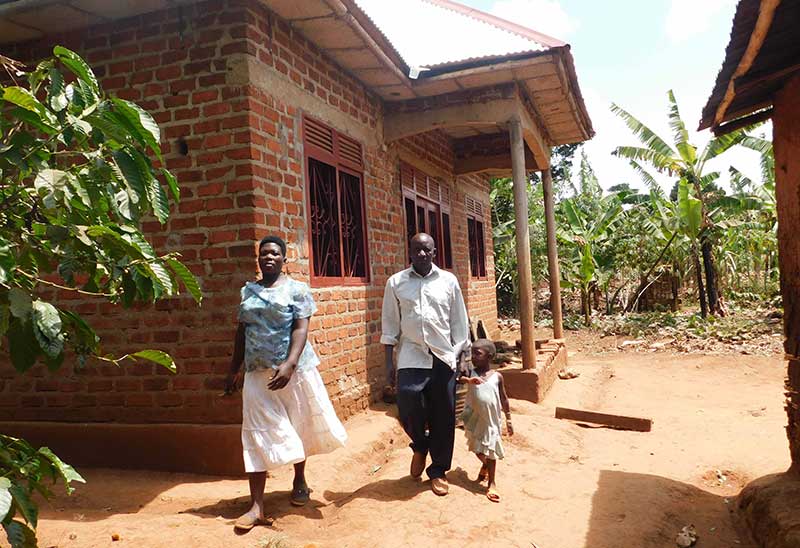
Happy-families-enjoy-stable-mental-health. Photos by Michael J. Ssali
Masaka Diocese has always put emphasis on the Amaka Amasanyufu (Happy Families) as a theme of the laity and Rev Father Kato Bakulu who has been Diocesan Education Secretary for many years says, “We find the objectives of the Happy Families study by ICHAD quite compatible with our diocesan objectives. We also want happy families free from stress, poverty, and conflicts. Remember Dr. Fred Ssewamala who heads both ICHAD and SMART has been conducting a number of research projects in Masaka Diocese since 2004 when he came up with the Suubi Project which taught us that even children orphaned by AIDS can save money and contribute to their own wellbeing.”
Bakulu went on to say that he had known Ssewamala since 2004 when he introduced his first research projects. They were about HIV and its impact on orphaned children, psychologically, socially, and economically. “Some were about economic empowerment for HIV positive adolescents and how it relates with ARV adherence. These were issues that we as Masaka Diocese were also passionate about but we lacked researched evidence which he provided. Right now this Happy Families project will give us researched information and methods for resolving marriage problems. Happy families are also strong marriages and this is what we all aspire for.”
During the training sessions the parents and the children learn the importance of observing family rules. One of the trainers, Mr Charles Bunnya, says: “Parents normally play a leading role in deciding which rules and for which age of their children. For example the teenage children must be at home by a certain time in the evening. When a meal is served there are rules to be followed like the way the food is shared and who takes the utensils for cleaning. There is a way of communicating when sometimes the rules are not observed and there is a way of reprimanding those who don’t observe the rules.”
According to him everybody, children and parents, in a family has responsibilities which must be carried out well for the family to be happy. The parents must find food and clothes for the children. The children do house chores like cleaning the compound or washing the dishes. Everybody contributes to the wellness of the family and if some people don’t do their job a few things go wrong.
“In a happy family there are positive relationships,” says Bunnya. “There ought to be an indication that they all care for one another. This helps the children to behave well and to think positively about other people. Respective communication in families — where no one barks at others— is one of the ways to raise well behaved children.”
The participants are further taught ways of avoiding stress in the home. It is written in the training manual, “Stress is something that happens to everyone –adults and children – and can get in the way of families doing well. It can come from sources within the home and outside of it.” Stress can result in mental issues in families. It goes on to state: “When we experience stress sometimes we need additional support to help us cope. Both parents and children need positive, responsible sources of support. Sources of support may include family members, friends, church, school, mental health professionals and community members.”
During the training and consultative meetings participants discuss such topics as behavioral health –stigma and discrimination, building family strength, rules for homes and problem solving for broken rules, respective communication, family relationships, responsibilities at home, dealing with stress at home, and dealing with environmental stressors and support systems. Everybody gets a chance to be heard and everyone does their share to solve problems.
On May 16, 2023 all adult participants in the study, local leaders, and other stakeholders including top religious leaders in Masaka Diocese assembled in Masaka City to exchange ideas and to share experiences. Masaka District Chairman, Andrew Batemyetto commended the effort by ICHAD, SMART and Masaka Diocese to improve mental health by building stable and happy families. He emphasized the importance of creating stable sources of income. “Lack of money in any home can be a big cause for stress and domestic violence,” he said.
Mugera Abdul from Masaka District Health Department said he was pleased that Masaka Diocese and ICHAD are working with health workers to promote mental health through the Happy Home project. “All that is going on in the study is about the issues that must take our attention as health workers. We commend their big effort.”

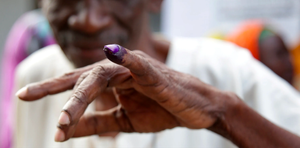






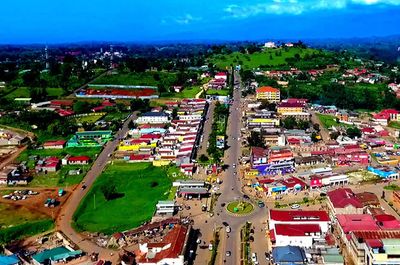



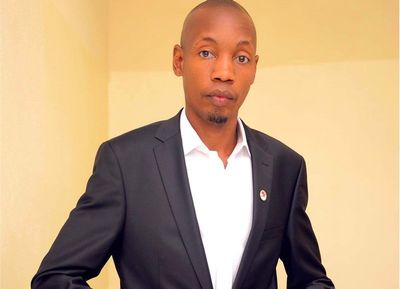
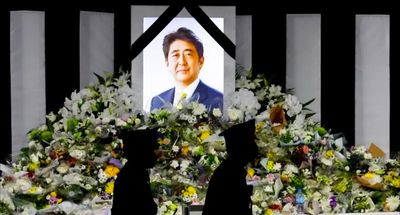
Michael J. Ssali
Leave a Comment
Your email address will not be published.